Standing In The Gap Between No Longer And Not Yet

Scenarios Of Standing In The Gap
I want to share with you some perspectives and practices that you may find helpful when you find yourself standing in the gap between where you are now and where you want to be.
The concept of standing in the gap has its roots in a military context in the ancient world. Ancient cities were protected by a city wall and if an attacking army breached this wall, warriors would stand in the gap to guard against invaders and fight in defense of the civilian population taking refuge within the city.
The modern meaning of the phrase has shifted 180 degrees from the protection and defence of others to the transition and expansion of the individual - a shift from the external to the internal, within a context of change.
Imposed Change and Chosen Change
Nothing is permanent and we all experience the transitions that arise as a result of change.
Some of these transitions are the result of imposed change and can be difficult and others are more welcome because they are the result of a change we have chosen.
Each of these scenarios are aspirational in that we have an idea of where we want to be but
the circumstance and conditions of our present circumstances are quite different in each scenario.
I want to start by taking a close look at imposed change. This one is tough.
Standing In The Gap In Conditions Of Imposed Change

This is about imposed change and surviving a dire and desperate situation where you are stuck in a difficult or seemingly impossible set of circumstances and it just goes on and on and there is no end in sight...
- You are nursing a very sick child and you have no idea if she will ever get better.
- Your marriage has broken down and you rarely see your children.
- You live in a prosperous first-world country but are unemployed and struggling to find work.
- You suffer from debilitating depression.
- You have live in poverty in a so called third world country and every day is a constant struggle to put food on the table for your family.
- You are a US citizen facing overwhelming bills from a recent medical emergency.
- You live in China and are imprisoned because of your political or religious beliefs.
- You are living in Gaza and your home and many of your family have been destroyed and you are living in a tent in desperate conditions.
- You are living in Ukraine near the front-line and are sheltering with your family in a basement.
- You live in a UK city in an area that is overwhelmed with crime and violence on the streets and are terrified for the safety of your children.
Such a broken world and so much pain and suffering... overwhelming circumstances... and on and on it goes with no end in sight...
No-one would chose to live like this but millions of us do and are living in conditions of change that are imposed upon us.
We have hope, even if only a little, the flame still flickers for a brighter better future.
We stand battered and scarred but we fight on. Somewhere deep inside us we cherish an ideal for a life and a hoped for a better future beyond present desperate circumstances.
We stand in the gap between no longer and not yet. But how?
Living In The Stockdale Paradox
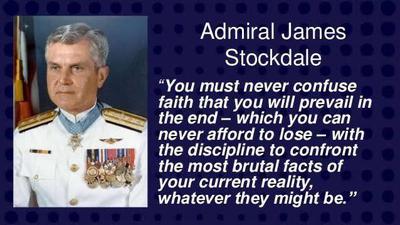
The Stockdale Paradox is named after the late James Stockdale, former vice presidential candidate, naval commander and prisoner of war during the American-Vietnam war.
Stockdale was held as a prisoner of war by North Vietnamese forces in the infamous Hoa Lo Prison that was referred to as "The Hanoi Hilton" by the American prisoners.
Tortured over twenty times during his eight-year imprisonment from 1965 to 1973, Stockdale lived out the war without any prisoner’s rights, no set release date, and no certainty as to whether he would even survive to see his family again.
After his release Stockdale explained how that he survived by holding an unshakeable faith that one day he would be free but at the same time he faced up to the daily grim realities of being a prisoner of war and being tortured.
The message here is that in times of prolonged and seemingly never-ending hardship, set-backs, suffering and distress we need to maintain hope or belief in an ideal that we will survive and pull through, and yet at the same time balance that with a total realism and practicality about the harsh present realities.
In 1975 in a letter to his wife from Robben Island where he was imprisoned, and some 15 years before he was released, Nelson Mandela said:
"Difficulties break some men but make others. No axe is sharp enough to cut the soul of a sinner who keeps on trying, one armed with the hope that he will rise even in the end."
Hoa Lo Prison and Robben Island were places where courage endured in the face of endless hardship, they were places where people kept on believing when it seemed their dreams were hopeless...
Drink deep the cup of bitter gall, No winner grows who has not failed ["Affirmation" © zen-tools.net]
Have pride and do not fear the fall,
Be strong and one day beat the tide,
Hold on and show the world you've tried.
So make that cup your holy grail.
Reach and standing where you are,
Reach out and catch a falling star.
Focus On Things You Can Control, Ignore The Rest
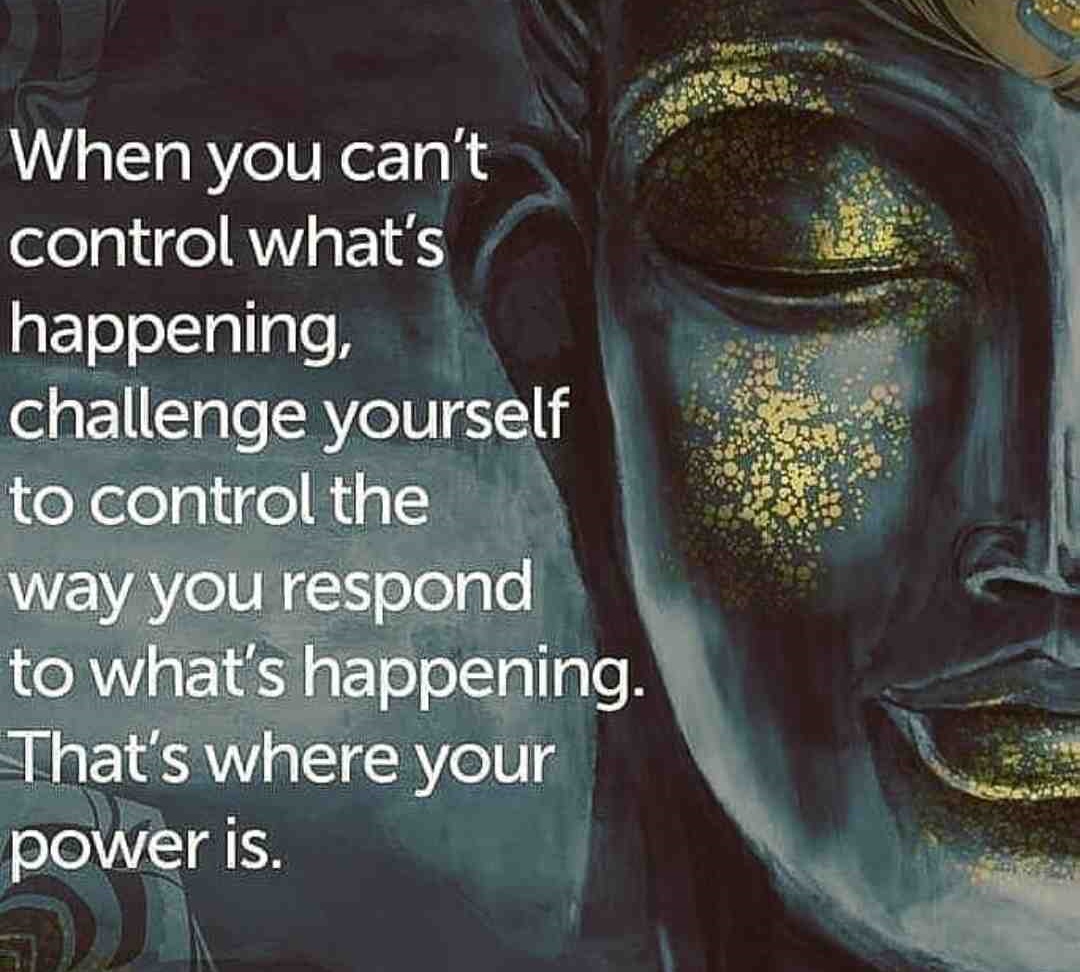
Interestingly, Stockdale also said there was no place for optimism in these desperate and difficult situations:
“The optimists. Oh, they were the ones who said, ‘We’re going to be out by Christmas.’ And Christmas would come, and Christmas would go. Then they’d say, ‘We’re going to be out by Easter.’ And Easter would come, and Easter would go. And then Thanksgiving, and then it would be Christmas again. And they died of a broken heart.”
Control and attachment
There are two issues here, the first is control. The mistake of optimism is to confuse aspiration with control. When you are in these circumstances you have no control over when and how your ideal or vision will be realised so it is pointless making plans and hoping.
The second issue is attachment. We are hardwired to attach. It's human nature. As soon as you start hoping for an outcome over which you have no control you are setting yourself for misery when it doesn't happen.
Stockdale was a student and a follower of the Stoic philosophers who taught that we should focus on those things we can control.
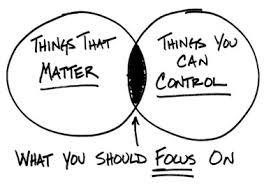
Modern psychologists refer to an “internal locus of control” and an “external locus of control.”
What this basically means is that if you have internal locus of control you will most likely believe that you are responsible for most of what happens in your life.
The consequence of this is that your response to events determines the outcomes you experience.
Whereas, if you have an external locus of control you will tend to blame others for your problems, and generally live a frustrated and unfulfilled life.
Evidence show that if you have an internal
locus of control there is greater likelihood of you being happier, less anxious, able to make better
decisions and accomplish more of your goals.
This idea has been
around for millennia in various formats. In modern times it is best
known as Reinhold Neibuhr’s “Prayer of Serenity”:
The Transforming Power Of Acceptance
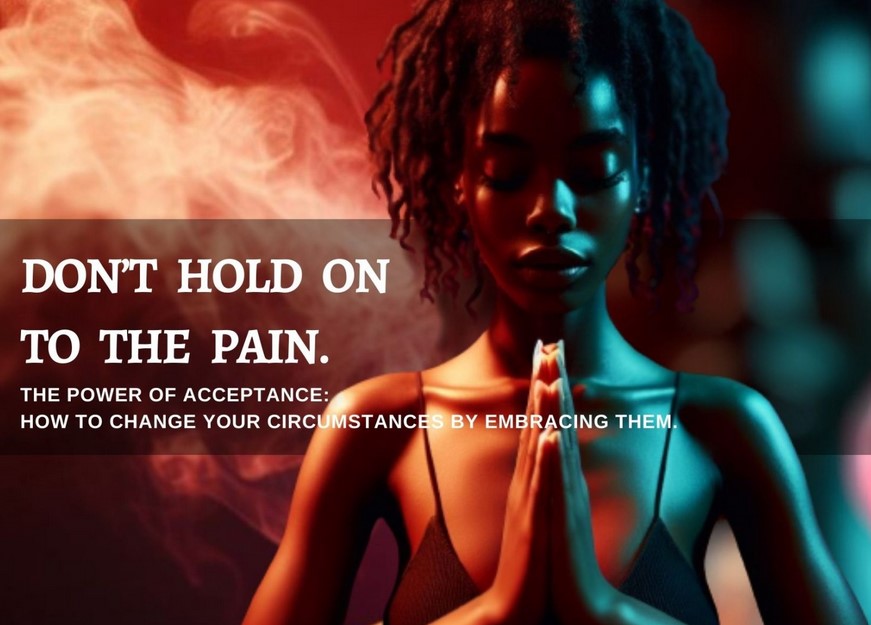
It's all very well asking for serenity in the face of never ending suffering and hardship but our natural and hardwired response is to resist pain.
But in these difficult circumstances when there is nothing more we can do to alleviate our pain, we have a powerful alternative option which is to accept our pain.
This may seem counterintuitive and even radical. So what does it mean?
Deep acceptance means willing to fully accept the present moment as it is. It does not mean you like it or are resigned to it, it simply means you completely acknowledge what is happening in the moment without struggling against it.
So what does this involve?
The act of acceptance involves turning towards pain.
Acknowledge with humility your suffering, your brokenness and your pain and allow something bigger than your suffering to open within you.
The power of acceptance is the freedom that it gives you.
Freedom from the tyranny of your thoughts and emotional responses to the events and circumstances of your life.
The transforming power of acceptance is that it:
- Stops you identifying with the torrent of words and thoughts it is constantly spewing out and it unfuses your thinking mind from your observing mind.
- Unhooks your dependence on a change in outer circumstances before you can make an inner change.
- Releases your feeling of being "stuck in waiting" and always looking forward or backwards.
- Releases your resistance to what is happening in your life.
- Brings you peace and calm.
- Centres you in the present moment, now.
Here is a simple proven practice for practicing the power of acceptance. Try it and use it every day for a week and notice the difference in how you feel.
How To Make Good Use Of Your Suffering
I want to conclude this section with one further suggestion.
As we have noted above, traditional teaching suggests that you have two options: you can resist suffering or you can accept it.
I want to offer you a third, and potentially more powerful option, you can use your suffering.
You can let go of self-centered worries and become a champion of compassion. It can be the greatest happiness of all.
In my experience, when you are standing in the gap in a situation of imposed change it is very easy to get caught up in your own problems and issues and to see the world very largely through the lens of your thoughts, feelings and experiences.
I also have found that this is intensified when dealing with long term and seemingly irresolvable problems.
In an earlier article I did share how that I have lived with certain issues for over 20 years and that from time to time cause me to feel overwhelmed and that I can see no light at the end of the tunnel.
But I also shared how that I have found that one of the most powerful ways to seeing some light at the end of my personal tunnel is to shift my focus away from myself and my situation and look for opportunities to show compassion and be the light to someone else.
I have found that I need this. It keeps me sane, it keeps me going and it gives me a sense of hope and my life a sense of meaning and purpose.
This idea is developed in Buddhist thought and teaching with the metaphor of "The Ferryman" who is someone who becomes "a champion of compassion".
The attitude of the Ferryman is that the pain that usually drags you down and causes you to withdraw into yourself is the stepping-stone for awakening your compassion and your understanding of the pain of others.
The Ferryman knows that we all cross the river of life together, that we are all in the same boat, we are all fundamentally the same and want the same things.
So, as the Ferryman you transmute the base metal of your own pain and suffering to bring hope and healing to others.
Standing In The Gap In Conditions Of Chosen Change

Now we are going to look at what standing in the gap means in situations where you have chosen the change.
It is important to draw a clear distinction between goal setting with an action plan to the achievement of that goal and choosing to change your current reality to a future reality to which you aspire and where there is no obvious route map.
Standing in the gap between a present reality and a future reality to which you aspire, especially when there is no obvious route map, involves navigating uncertainty and taking proactive steps toward an envisioned goal despite the lack of clear guidance or precedent.
This is about living in, and being a part of, a transformation. It is not external to you it is within you. You are the process.
Here are a few examples of some ordinary people who have aspired and achieved in extraordinary ways.
[1] Educational Advancement - Malala Yousafzai
- Background: Malala was a young girl in Pakistan advocating for girls' education.
- Aspirational Change: After surviving a Taliban assassination attempt, she continued her advocacy on a global scale.
- Outcome: Malala won the Nobel Peace Prize and now attends Oxford University while continuing her activism.
[2] Social Impact - Blake Mycoskie
- Background: Blake was a serial entrepreneur looking for a new venture.
- Aspirational Change: He founded TOMS Shoes with a unique business model where every pair sold resulted in a pair given to a child in need.
- Outcome: TOMS has donated millions of shoes, transforming the concept of corporate social responsibility.
[3] Overcoming Adversity - Nick Vujicic
- Background: Nick was born without limbs, facing significant physical and emotional challenges.
- Aspirational Change: He embraced his condition, developing a positive mindset and motivational speaking career.
- Outcome: Nick became a renowned motivational speaker, inspiring millions worldwide with his story and perspective on life.
[4] Environmental Advocacy - Wangari Maathai
- Background: Wangari Maathai was an environmental and political activist, the first woman in East and Central Africa to earn a doctorate.
- Aspirational Change: She founded the Green Belt Movement in 1977, focusing on environmental conservation and women's rights.
- Outcome: Maathai's work led to the planting of over 30 million trees and she became the first African woman to receive the Nobel Peace Prize in 2004.
[5] Inventor - William Kamkwamba
- Background: Kamkwamba is an inventor and author who taught himself engineering as a teenager.
- Aspirational Change: He built a windmill from scrap materials to provide electricity for his village.
- Outcome: Kamkwamba’s story inspired the book and film "The Boy Who Harnessed the Wind," bringing attention to the power of innovation and education in overcoming adversity.
[6] Children's Rights Campaigner - Ray Lewis
- Background: : Born in Guyana, Ray Lewis moved to the UK and joined the Metropolitan Police Service. After leaving the police force, he pursued a career in ministry and community work.
- Aspirational Change: In 2002, Lewis founded the Eastside Young Leaders' Academy in East London, focusing on leadership development for young Black boys.
- Outcome: Ray Lewis's work with EYLA demonstrates the profound impact that focused leadership development and community support can have on young Black people.
What This Means In Practice

In summary, standing in the gap in these situations requires:
- Knowing where you want to get to - You have a clear idea of what you want to achieve or the change you want to see, even if the path to get there is not clear. You are deeply committed to this vision and willing to invest time, effort, and resources to make it a reality.
- Embracing uncertainty - There is no established roadmap so you must be comfortable making decisions with incomplete information and adapting as new information becomes available.
- Persistence and resilience - You will encounter obstacles, setbacks, and failures. Patience and resilience is crucial to keep moving forward despite these difficulties and especially when progress seems slow or uncertain.
- Incremental progress - Focus on making small, manageable steps toward the larger goal. Each step forward can provide learning and momentum.
- Flexible and adaptable - Being flexible and willing to adjust your plans as circumstances change or as you gain new insights.
- Leading by example - Inspiring and motivating others to join you and building a support network with others who share your vision or who can provide support, advice, and collaboration to help achieve the goal.
- Authenticity - Maintaining your core values and principles throughout the journey, ensuring that the actions taken align with the larger vision. Being honest and transparent about the challenges and progress, building trust and credibility.
How To Maintain Your Balance
Standing in the gap in these situations of chosen change requires a consistently balanced approach in your responses to the challenges that you will face.
# This starts with the balance between realism and aspiration.
If you get drawn into reality you can get stuck in corrosive cynicism on the one hand and if you get drawn into aspiration and possibility on the other hand you can just float around in a dream of insubstantial idealism.
# Adopting a beginners mind.
This means dropping all former strategies that have worked so well for you in the past and being completely open to new ways of doing things. This is a paradigm shift as you release yourself from the grip of past success strategies.
# Separating events from how you interpret them.
This involves being prepared and open to not know, and just to let things happen and be.
# Being careful how you frame things.
Where you do offer interpretations, do so from the position of future possibility not past experience.
# Also being careful about how you measure your progress.
Focus on the process and not the aspiration. Shift your focus from the long-term ideal to the daily routine that will realise that ideal. Measure the small steps in the process.
# Make the total commitment.
This means that like the old samurai warriors you "die before you go into battle" - you face and accept failure and be prepared to lose everything: reputation, income, relationships and in fact just about everything you hold dear and value, and all this before you start.
Next Article: Preparing The Ground - For Things You Can Not See Further Reading: Recognising Limbo As A Stage Of Transition The Wilderness Years - 3 Keys To An Exit Lost In Transition - Lost, Stuck & Going Round In Circles Give Thanks In Everything - Respond To What Happens Don’t React My Experience Of Mindfulness - In Situations Of Imposed Change The Long Game - Delay Gains Now To Get More Later The Challenges Of The Road Less Traveled - When Playing The Long Game Return from: "Standing In The Gap" to: Inner Mastery For Outer Impact or Walking The Talk
LATEST ARTICLES
Staying Committed When You Can't See Progress - The Psychology of Grit
 Uncertainty Is Not The Absence Of Progress, Only The Absence Of Reassurance. One of the most destabilising experiences in modern life is not failure, but uncertainty and staying committed when you can…
Uncertainty Is Not The Absence Of Progress, Only The Absence Of Reassurance. One of the most destabilising experiences in modern life is not failure, but uncertainty and staying committed when you can…The Battle For Your Mind - How To Win Inner Freedom In A Digital Age Of Distraction
 From External Events to Inner Events. We often think of “events” as things that happen out there: the traffic jam, the rude comment, the delayed email reply. But what truly shapes our experience is wh…
From External Events to Inner Events. We often think of “events” as things that happen out there: the traffic jam, the rude comment, the delayed email reply. But what truly shapes our experience is wh…How to See Your Thoughts Without Becoming the Story
 A Practical Guide to Thought-Awareness. You can spend your life inside the stories of your mind without ever learning how to see your thoughts clearly and objectively. Most of the stuff we tell oursel…
A Practical Guide to Thought-Awareness. You can spend your life inside the stories of your mind without ever learning how to see your thoughts clearly and objectively. Most of the stuff we tell oursel…The Collison Decision Matrix - A Simple Framework for Better Choices
 The Collison Decision Matrix Is A Practical Everyday Thinking Tool. Most of us spend a surprising amount of time worrying about decisions. From small ones such as what to wear, what to eat, what to te…
The Collison Decision Matrix Is A Practical Everyday Thinking Tool. Most of us spend a surprising amount of time worrying about decisions. From small ones such as what to wear, what to eat, what to te…The Power Of Asking The Right Question
 The Power Of Asking The Right Question Lies In The Quest For Insight. To experience the power of asking the right question you must develop the practice of asking questions. The best way to improve th…
The Power Of Asking The Right Question Lies In The Quest For Insight. To experience the power of asking the right question you must develop the practice of asking questions. The best way to improve th…Site Pathways
 Here is a site pathway to help new readers of Zen-Tools navigate the material on this site. Each pathway is based around one of the many key themes covered on this site and contain a 150 word introduc…
Here is a site pathway to help new readers of Zen-Tools navigate the material on this site. Each pathway is based around one of the many key themes covered on this site and contain a 150 word introduc…How To Live With Contradiction - Beyond Thought Let Stillness Speak
 A major impact on so many peoples' lives is the situational contradiction of unfilled realistic expectations. So where does all this leave us? Well here we are, with mental equipment that is more lim…
A major impact on so many peoples' lives is the situational contradiction of unfilled realistic expectations. So where does all this leave us? Well here we are, with mental equipment that is more lim…How To Trust The Process Of Mindfulness - Right Now
 In mindfulness, the process isn’t some distant goal — it's what is happening right now. When we talk about how to trust the process of mindfulness the credibility of the process is heavily dependent…
In mindfulness, the process isn’t some distant goal — it's what is happening right now. When we talk about how to trust the process of mindfulness the credibility of the process is heavily dependent…Inner Mastery For Outer Impact - Mental Clarity For Effective Action
 Insights only matter if they translate into consistent action. In a world crowded with quick fixes and motivational soundbites, the theme “Inner Mastery for Outer Impact” calls us to something more e…
Insights only matter if they translate into consistent action. In a world crowded with quick fixes and motivational soundbites, the theme “Inner Mastery for Outer Impact” calls us to something more e…The Wise Advocate - Helping You Achieve The Very Best Outcome
 The focus of your attention in critical moments of choice either builds or restricts your capacity for achieving the best outcome. When we talk of 'The Wise Advocate' its easy to think of the consigl…
The focus of your attention in critical moments of choice either builds or restricts your capacity for achieving the best outcome. When we talk of 'The Wise Advocate' its easy to think of the consigl…Trust The Process - Beyond The Cliche
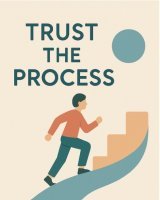 The phrase "trust the process" has become a cliche, the woo-woo mantra of the "self help" industry. Those three little words feel like they ought to mean something useful but hidden behind them are a…
The phrase "trust the process" has become a cliche, the woo-woo mantra of the "self help" industry. Those three little words feel like they ought to mean something useful but hidden behind them are a…The Dopamine Delusion - Why Anticipation Beats Achievement
 The thrill we feel is not in the having, but in the wanting. The more we have, the more we want. The more things we acquire and the easier things get for us, the more discontent we feel. The more spo…
The thrill we feel is not in the having, but in the wanting. The more we have, the more we want. The more things we acquire and the easier things get for us, the more discontent we feel. The more spo…



